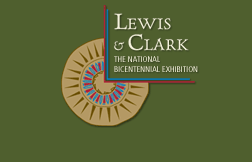
IMAGE GALLERY
 |
 |

Access the Image Gallery to see all images, objects, and documents used in this lesson plan.
 |
View Image Gallery

|

|
 |



Lesson Plan 4: Seeking Sacagawea's Role
OBJECTIVES
Students will:
- use historical documentation as a basis for narrative writing
- write about Sacagawea's role in the Lewis and Clark expedition
- analyze primary source materials and draw conclusions
MATERIALS
OPENING
Open with the question: "Who was Sacagawea?" Brainstorm ideas for five to ten minutes, writing the ideas on the board or on the overhead.
 Use the following questions to stimulate discussion, assess student knowledge, and provoke thought: Use the following questions to stimulate discussion, assess student knowledge, and provoke thought:
- Why are Sacagawea and Jean Baptiste pictured on a United States coin?
- Are there other women who also might have been pictured?
- If you were William Clark and Meriwether Lewis, would you have chosen to take a woman and a baby on the expedition?
- Why do you think they took her along? (they hired her husband as an interpreter and wanted her knowledge of the Shoshone language)
- Do you think Sacagawea helped the expedition or might she have been a hindrance?
- What qualities would a person have to possess in order to survive this type of journey?
PROCEDURE
- What exactly was Sacagawea's role on the expedition?
- Divide class into groups of three to four and hand out excerpts from the journals. These excerpts refer to Sacagawea during the expedition. Have students read the excerpts, discuss with the group, and enter thoughts on the Notes about Sacagawea worksheet.
- A brief, large-class discussion, guided toward examining the role Sacagawea played on the journey, should follow. Main conclusions should be listed on the overhead. It is important to note that she was not the expedition's guide. Her roles included: mother, interpreter, and food gatherer. Her presence communicated that the group was not a war party. Her recognition of her childhood lands helped Lewis and Clark know they were close to where her people lived.
- Distribute copies of "Clark's Letter to Charbonneau" (August 20, 1806) and the Document Analysis Worksheet. Direct students to read the letter using the worksheet.
- After students have completed their initial analysis, distribute the analysis guide specific to this document. The questions relate directly to the document's content.
- Review student conclusions. Discuss the questions:
- What was Clark's one regret concerning Sacagawea?
- Why do you think he felt he was he unable to do something about this?
CLOSING
Read the following quote from the Lewis and Clark journals:
William Clark, August 17, 1806
"we also took our leave of T. Chabono, his Snake Indian wife and their child who had accompanied us on our rout to the pacific ocean in the capacity of interpreter and interpretes. ...his services were no longer of use to the U. States and he was therefore discharged and paid up."
Question: Do you think Sacagawea's gender had something to do with her lack of compensation? Why or why not?
Assign a short paper, answering the question: "What was Sacagawea's importance to the expedition?" Use examples from excerpts in this lesson to support your answer.
[PRINTABLE VERSION]
|
 |







